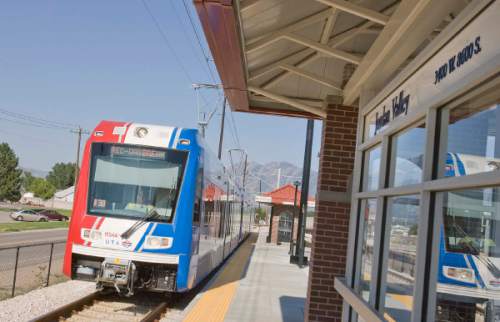This is an archived article that was published on sltrib.com in 2016, and information in the article may be outdated. It is provided only for personal research purposes and may not be reprinted.
Commuters, rejoice.
Utah Transit Authority officials are recommending a permanent policy to offer free parking at all its rail stations — saying that charging $1 daily at two stations was a flop.
Officials also suggest continuing to allow long-term parking at most rail stations — used mostly by airline passengers who take TRAX to the airport for flights. But the agency says that may not be possible at the most crowded stations.
The recommendations were discussed at a recent UTA Board committee meeting.
Levi Roberts, a UTA strategic planner, noted the agency started charging $1 a day in 2011 to park in new garages at the Jordan Valley TRAX station in West Jordan and later at the Draper FrontRunner station.
UTA had figured it could charge for parking because garages offered more protection from the weather and at the time offered more security camera coverage. It was anticipated fees could help pay for maintenance of the facilities.
But when few people actually parked there, UTA decided as an experiment to temporarily halt charging for parking in 2013 to see what effect it might have — and it has never resumed collecting the fees.
Roberts said UTA research found that charging for parking — and the expense of collecting it — doesn't make sense "because there are a lot of other options out there for people to park for free."
The two stations with paid parking had plenty of free, on-street parking nearby that people used instead, he said. Also, because UTA itself has many other free parking lots, Robert said, "if you charge at one park and ride, it's likely that someone will just drive a half-mile … to another park and ride."
Roberts added that some commuters decided to skip transit, figuring they could drive all the way to work and park for free or cheaply there.
"If you look at [paid parking] to get revenue," Roberts said, "it just drives people away."
UTA staff is now recommending that the board adopt a permanent policy of free parking at its rail stations — a proposal the panel took under advisement.
Of note, the two parking garages that charged for parking were part of what state legislative auditors in 2014 blasted as sweetheart deals for a developer who had close ties to a former UTA Board member.
Developer Jeff Vitek was given $10 million in advance by UTA to build a garage in Draper that was never built (the one there now was later constructed by others), and the agency had not retrieved all the money when the report was written in 2014 — so auditors said the money had essentially become a loan to the developer.
Vitek was also chosen as a UTA partner to develop a commercial-residential project at the Jordan Valley station. UTA used $26 million in local and federal funds to build two large garages there, with 598 stalls, to serve both the station and Vitek's future development. Auditors said the garages sat mostly empty for years.
Roberts said UTA staff also looked at long-term parking at rail stations — something allowed at most of them since the airport TRAX line opened. Exceptions were made for lots that usually fill up with daily traffic, or where zoning or other restrictions prevent long-term parking.
UTA officials say long-term parking doesn't seem to cause problems with daily commuters at most locations, nor does it attract more crime. Only half UTA's 16,000 parking spaces are used on an average day, they said, in part because they were built to meet projected demands for 2030.
Roberts said UTA is reviewing whether to allow conversion of parts of a few lots with ultra-low utilization to housing or offices that might draw more transit riders.



